Digging in the Dirt: March Chapter & Planting Highlights

March chapter and planting highlights
North Carolina Wildlife Federation staff and Community Wildlife Chapter volunteers did a whole lot of environmental educating, wildlife watching, tree planting, trail maintaining, habitat restoring and more in March to promote healthy wildlife habitat and inspire people to get outside.
In total, 350-plus volunteers removed over 10 thousand pounds of trash and planted over 200 native plant species. Nearly 300 people were given the opportunity to connect with nature through one of NCWF’s various opportunities this month.
Thanks to partners such as the Duke Energy Foundation, Jandy Ammons Foundation and Burt’s Bees for helping make these habitat restoration workdays, educational programs and nature outings possible. Explore our Events Calendar to discover where NCWF and our Community Wildlife Chapters are hosting in-person and virtual events near you. Check out a few highlights below from our conservation outreach team.
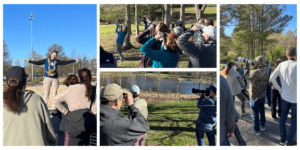
Guided Bird Tour of the Art Park, March 4. Local NCWF chapter members were treated to a bird walk at the NC Museum of Art in Raleigh. Ranger Chantal Taunton guided the tour and charismatically shared her knowledge and love of the park’s bird life. The group saw a wide variety of bird species including red-bellied woodpeckers, fish crows, tufted titmice, ruby-crowned kinglets, pine warblers and a cooper’s hawk soaring high above.
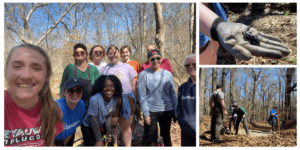
UCAN Help Maintain the Trails, March 4. NCWF staff and volunteers joined Urban Community AgriNomics to help build and maintain the trail network at Catawba Trail Farm. The crew cleared fallen tree branches and used them to line the trails. Trails are an excellent way for people to connect with nature and trail work days are essential to ensuring the trails remain viable.
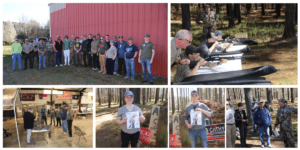
Getting Started in the Outdoors with Gaston PAWS, March 4. Beginner and novice hunters spent the day at Wood Duck Farm in Gastonia learning the ins and outs of turkey hunting. The Turkey Hunting 101 Workshop was part of Getting Started Outdoors (GSO), a program geared toward those new to hunting and who don’t have a hunting community support network.
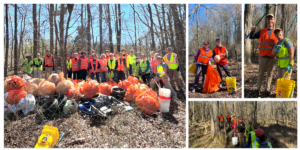
Habitat Restoration at the Mouth of Ellerbe Creek, March 5. NCWF in partnership with the Friends of the Mountains-To-Sea Trail hosted a habitat restoration workday at the mouth of Ellerbe Creek in Durham. The motivated crew of 27 successfully removed 935 pounds of debris from the water’s edge.
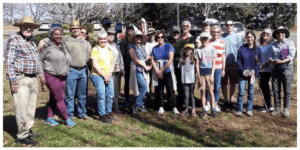
Bee and Beaver Nature Walk, March 7. The Neuse River Hawks hosted a bonus nature walk at Joyner Park in Wake Forest — the town’s newest and largest park. Participants witnessed various signs of wildlife including extensive ground bee habitat and numerous beaver dams.
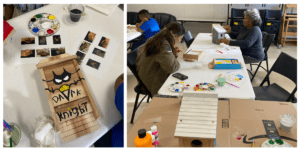
Build a Bird or Bat House, March 8. NCWF staff worked together with Pocosin Lakes NWR and Pocosin Arts School of Fine Craft to host a bird and bat house building workshop. Participants learned about the local bats and birds that will hopefully take up residency in their newly built houses.
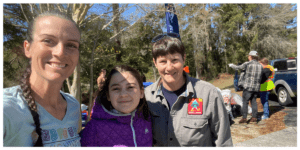
Island Wildlife Cleanup with Cape Fear River Watch, March 11. Island Wildlife volunteers participated in Cape Fear River Watch’s cleanup event at Greenfield Lake watershed in Wilmington. The large crew of 89 picked up 1564 pounds of trash and 497 pounds of recyclables while engaging in some serious trash talk!
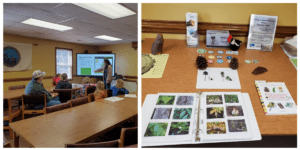
ecoEXPLORE Introduction to Botany, March 14. NCWF staff, Pocosin Lakes NWR and Tyrell County Public Library educated kids all about the wonderful world of plants as a part of the ecoEXPLORE citizen science program.
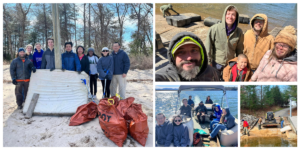
Lake James Annual Cleanup, March 18. The Lake James Area Wildlife and Nature Society gathered for its annual trash cleanup where 172 participants of all ages removed over 8,000 pounds from both shorelines and roadways near Lake James State Park. Large, bulky items like tires and wood planks were collected and removed, as well as harmful small plastics that can suffocate wildlife.
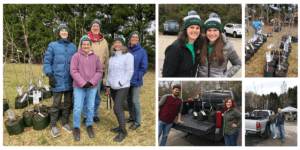
Bradford Bounty Tree Exchange, March 18. Local residents near Wake Forest who removed an invasive Bradford pear tree received a free native tree as a replacement. The event was a collaborative effort between NC State Extension, NC Urban Forest Council, NC Forest Service and the NC Wildlife Federation with the help of volunteers from the Neuse River Hawks.
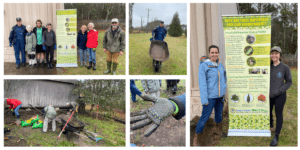
Pollinator Garden Planting at the Red Wolf Center, March 18. NCWF and Pocosin Lakes NWR got their hands dirty while planting pollinator plants at the Red Wolf Center in Columbia. The group planted a variety of natives such as elderberry, spicebush, eastern blue star, swamp rose, dwarf crested iris and more!
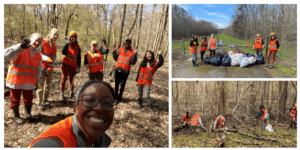
Haw River Assembly Clean-Up-a-Thon, March 18. NCWF volunteers joined Haw River Assembly’s annual Clean-Up-a-Thon and picked up over 500 pounds of garbage. For the last 33 years, this event has been dedicated to raising watershed-wide awareness about the impacts of our consumption habits and bringing people together to clean up the river and local creeks.
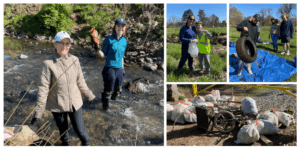
I Spy Trash, March 19. The Charlotte Wildlife Stewards took part in Charlotte Mecklenburg Storm Water Services’ Creek Week. The crew of 28 removed 635 pounds of trash from Briar Creek at Chantilly Ecological Sanctuary. UNC Charlotte student, Sophie Barnett, and her team sorted the trash into plastic, paper, metal, and glass to gather data for her honors research project.
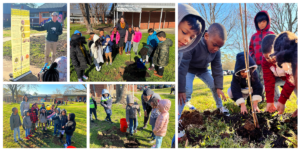
Red Maple Presentation & Planting, March 20. Millbrook Magnet Elementary School in Raleigh has been teaching their kindergarten students all about the importance of native trees this quarter. NCWF donated a red maple for each of the kindergarten classes and was on site to help the students plant the trees on the first day of spring.
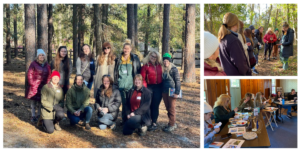
Hike & Hoop, March 21. Island Wildlife and Friends School of Wilmington hosted a Hike & Hoop workshop and fundraiser at the Longleaf Center for Environmental Learning. The workshop began with a botanical hike led by biologist Jess Roach followed by an embroidery session with embroiderist Kevina Cassaletto.
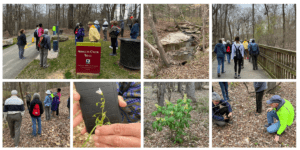
Abbott’s Creek Greenway Nature Walk, March 22. The Neuse River Hawks continued their support of the 2023 Year of the Trail initiative by hosting a nature walk at Abbott’s Creek Greenway in North Raleigh. The group enjoyed a peaceful stroll through the wetlands while learning about the native flora and fauna.
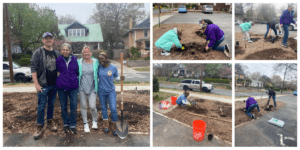
Pollinator Planting at Watts Baptist Church, March 22. NCWF created a pollinator garden at Watts Baptist Church in Durham. The group planted a variety of pollinator plants including American beautyberry, little bluestem, purple coneflower, bee balm, milkweed and more!
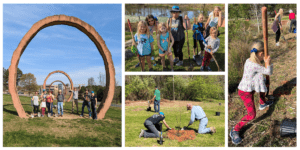
Native Tree Planting at the NC Museum of Art, March 24. The South Wake Conservationists hosted a native tree planting at the North Carolina Museum of Art in Raleigh. The volunteer crew traveled all over the park’s campus and planted over 100 native trees including hazelnut, pawpaw, shagbark hickory, beech, sycamore, scarlet oak, sweetbay magnolia, persimmon and more! These newly established trees will be an excellent source of food and shelter for the park’s native wildlife.
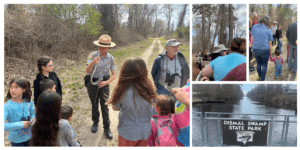
Great Dismal Swamp Wagon Ride, March 25. NCWF and Ranger Katie Sanford at Dismal Swamp State Park took participants on a ride through the swamp on the Dismal Swamp Express while learning about the fascinating history of the park and the abundance of wildlife that the park’s habitat supports.
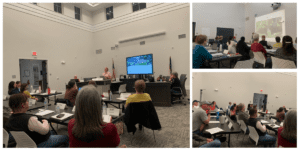
Gardening in the Southern Piedmont Series, completed March 27. MARSH, the Union County Master Gardeners, NC State Extension and Wild Ones Charlotte Piedmont Chapter hosted a collaborative five class series focused on gardening in the Mecklenburg/Union County area for new residents and/or new gardeners in the greater Union County area.
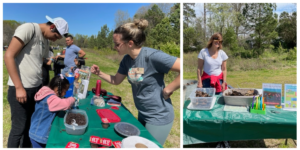
Winterfield Family Field Day, March 25. Charlotte Wildlife Steward leaders joined the Winterfield Family Field Day and taught kids and their families how soil is made through decomposition by the FBI – fungi, bacteria, and invertebrates. Visitors found fungus, earthworms, millipedes, snails, grubs, ants, and pill bugs on samples of decaying wood and leaves. A bucket of compost illustrated the end product made by the decomposers. The best part was the “soil cup” each kid made with chocolate pudding, crushed oreos, and gummy worms! Yum!
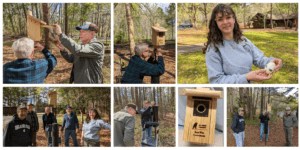
Bluebird House Installation, March 29. South Wake Conservationists installed new, custom-branded bluebird houses at Wake County’s Crowder Park in Apex. The team worked with Sarah Goldsmith, Park Technician of Education at the park, to identify and replace eleven old houses that had deteriorated and were no longer usable.

